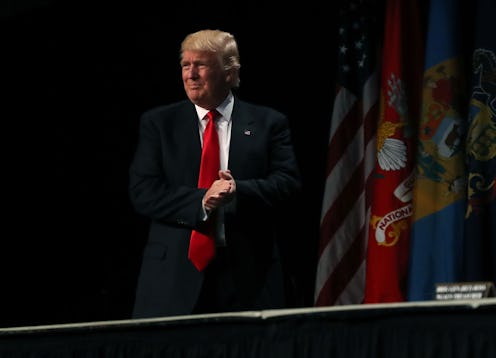News
Trump-Pence Women’s Empowerment Tour Misses Point
Female relatives and personal associates of Donald Trump have set out on the "Trump-Pence Women’s Empowerment Tour" in an effort to boost support for Trump among the women of Ohio. In the words of tour member and Trump's daughter-in-law, Lara Trump, as reported by Politico, their mission is to "go out and tell people what a great guy Donald Trump is." The group's composition of not only women but mostly women of color "speaks to who Donald Trump is," Lara said.
However, this tour misses a crucial point: Regardless of who the man is on the inside — even if he is, in his personal life, completely non-discriminatory of people of various backgrounds — his rhetoric, and what it fosters among the electorate, are what matter most. And that rhetoric can embolden the voices of misogyny and racism.
From calling undocumented immigrants criminals to proposing a ban on Muslims entering the United States (yes, he's walked back on this policy to certain degrees) to making comments about former Republican primary challenger Carly Fiorina's face, Trump has been the subject of scrutiny throughout his campaign for what critics have called racist, sexist, Islamophobic, and xenophobic rhetoric.
The "Trump-Pence Women's Empowerment Tour" apparently seeks to loosen the association between the person and the rhetoric by showing what Lara called a "softer" version of Trump — the fast food-eating guy who loves his grandchildren. Lara described what it was like when she first met Trump, saying, he "turned to me and he said, ‘Would you like an ice cream? I’m going to get an ice cream.’” Omarosa Manigault said Trump turns to "putty" with his grandchildren.
It could be that Trump, personally, does not espouse negative views toward Muslims or women or Mexicans. Maybe his comments and proposals are examples of political opportunism, and he's trying to give people what he thinks they want — men, a sense of greater worth, and the economically struggling, scapegoats for their woes. What Trump the man believes and what Trump the politician says may not be the same. But the latter is what we should prioritize, and not just because it's the best indication the general public has of the former, but because, most importantly, of what it threatens to create.
When the most-heard political voice in the country, coming from a man who is a major-party presidential candidate, makes sexist public comments regarding women, I believe it sends a message to the men of this country who are struggling that the way to assert power is to devalue women. When that voice gives those who are struggling a couple groups of people to pin their fears and blame their economic status on, it makes it more likely that the downtrodden will buy into the rhetoric. Interestingly, a recent analysis of Trump supporters shows that they are by no means disproportionately impoverished; what they do have, across all financial brackets, is higher levels of "economic insecurity," as Gallup economist Jonathan Rothwell noted. In short, they're worried about their economic status, regardless of income, and I believe Trump's rhetoric plays to those fears.
Trump's rhetoric offers a dangerous air of legitimacy to base sentiments that threaten to promote policies that harm various groups of people and encourage interpersonal discrimination and violence. No matter how much KFC he eats or how much he loves his grandchildren, Trump is not just a normal guy, contrary to the narrative being pushed by the "Trump-Pence Women's Empowerment Tour." His rhetoric is far more powerful.
